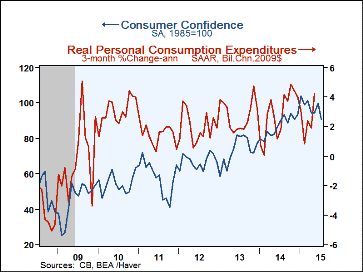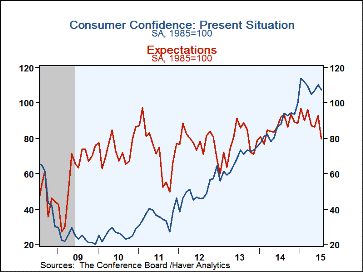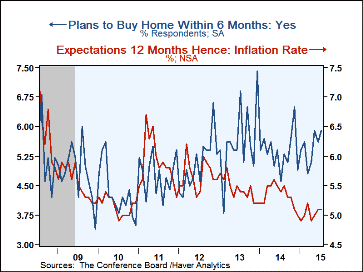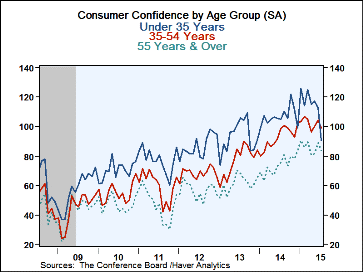 Global| Jul 28 2015
Global| Jul 28 2015U.S. Consumer Confidence Retreats to 10-Month Low
by:Tom Moeller
|in:Economy in Brief
Summary
The Conference Board's Consumer Confidence Index declined 8.9% this month (+0.7% y/y) to 90.9 from 99.8 in June, revised from 101.4. It was the lowest reading since last September and missed expectations for 100.0 in the Action [...]
The Conference Board's Consumer Confidence Index declined 8.9% this month (+0.7% y/y) to 90.9 from 99.8 in June, revised from 101.4. It was the lowest reading since last September and missed expectations for 100.0 in the Action Economics Survey. During the last ten years, there has been a 43% correlation between the level of confidence and the three-month change in real personal consumption expenditures.
The consumer expectations component collapsed 13.9% to 79.9 (-13.1% y/y), the lowest level since February of last year. The present situations figure eased 2.6% to 107.4 (+22.2% y/y), the lowest level in two months.
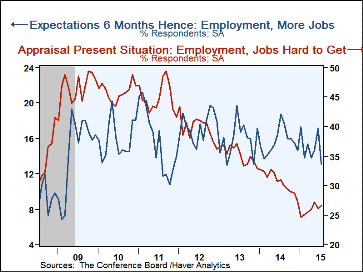 The percentage indicating that business conditions would get better reversed
two months of improvement and collapsed to 14.7%, the lowest level since
November 2011. Thirteen percent of respondents thought there would be more jobs,
the least since late 2011 while the percentage which thought there would be
fewer jobs surged. The expected inflation rate held at 5.1% and a raised 62.0%
expected higher interest rates in twelve months and a lesser 32.4% expected
higher stock prices. Nevertheless an increased 5.9% expected to buy a home
within six months and the percentage which planned to purchase a major appliance
neared the July 2010 high.
The percentage indicating that business conditions would get better reversed
two months of improvement and collapsed to 14.7%, the lowest level since
November 2011. Thirteen percent of respondents thought there would be more jobs,
the least since late 2011 while the percentage which thought there would be
fewer jobs surged. The expected inflation rate held at 5.1% and a raised 62.0%
expected higher interest rates in twelve months and a lesser 32.4% expected
higher stock prices. Nevertheless an increased 5.9% expected to buy a home
within six months and the percentage which planned to purchase a major appliance
neared the July 2010 high.
Respondents indicating that business were good fell to 24.2%, the least since September. The percentage reporting that jobs were plentiful eased m/m to 20.7%, but remained near the seven-year high. Jobs were viewed as hard to get by 26.7% of respondents, just above the recovery low of 24.6% reached six months ago. Jobs were viewed as not so plentiful by 52.6% of respondents, down from the December high of 55.5%.
Confidence deteriorated across age groups. The greatest decline in confidence was reported by those under age 35. Their confidence plummeted to the lowest level since November 2010 (-13.5% y/y). Respondents between the ages of 35 and 54 reported a modest easing in confidence (+0.6% y/y) as did individuals in the older age bracket (+10.3% y/y).
The Consumer Confidence data is available in Haver's CBDB database. The total indexes appear in USECON and the market expectations are in AS1REPNA.
| Conference Board (SA, 1985=100) | Jul | Jun | May | Y/Y % | 2014 | 2013 | 2012 |
|---|---|---|---|---|---|---|---|
| Consumer Confidence Index | 90.9 | 99.8 | 94.6 | 0.7 | 86.9 | 73.2 | 67.1 |
| Present Situation | 107.4 | 110.3 | 107.1 | 22.2 | 87.3 | 67.6 | 49.8 |
| Expectations | 79.9 | 92.8 | 86.2 | -13.1 | 86.6 | 77.0 | 78.6 |
| Consumer Confidence By Age Group | |||||||
| Under 35 Years | 90.6 | 112.7 | 117.3 | -13.5 | 106.6 | 93.1 | 86.5 |
| Aged 35-54 Years | 99.4 | 104.5 | 100.1 | 0.6 | 92.4 | 76.8 | 68.5 |
| Over 55 Years | 83.7 | 89.2 | 81.7 | 10.3 | 73.8 | 61.2 | 56.7 |
Tom Moeller
AuthorMore in Author Profile »Prior to joining Haver Analytics in 2000, Mr. Moeller worked as the Economist at Chancellor Capital Management from 1985 to 1999. There, he developed comprehensive economic forecasts and interpreted economic data for equity and fixed income portfolio managers. Also at Chancellor, Mr. Moeller worked as an equity analyst and was responsible for researching and rating companies in the economically sensitive automobile and housing industries for investment in Chancellor’s equity portfolio. Prior to joining Chancellor, Mr. Moeller was an Economist at Citibank from 1979 to 1984. He also analyzed pricing behavior in the metals industry for the Council on Wage and Price Stability in Washington, D.C. In 1999, Mr. Moeller received the award for most accurate forecast from the Forecasters' Club of New York. From 1990 to 1992 he was President of the New York Association for Business Economists. Mr. Moeller earned an M.B.A. in Finance from Fordham University, where he graduated in 1987. He holds a Bachelor of Arts in Economics from George Washington University.
More Economy in Brief
 Global| Feb 05 2026
Global| Feb 05 2026Charts of the Week: Balanced Policy, Resilient Data and AI Narratives
by:Andrew Cates


